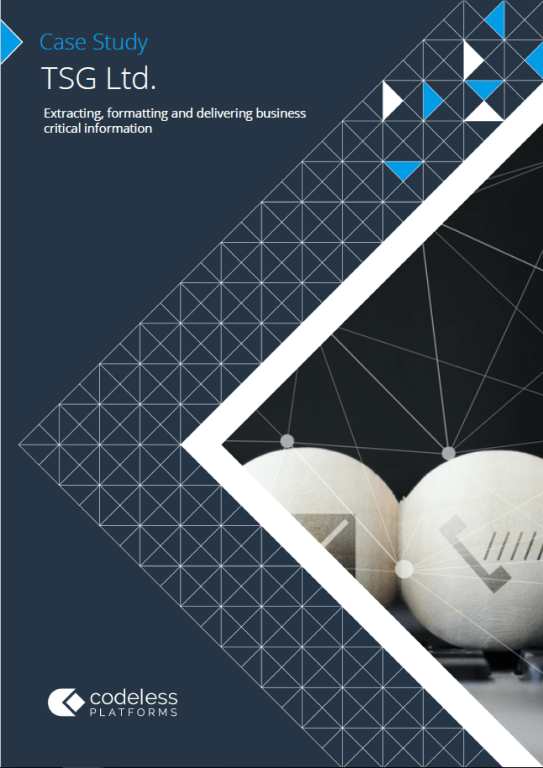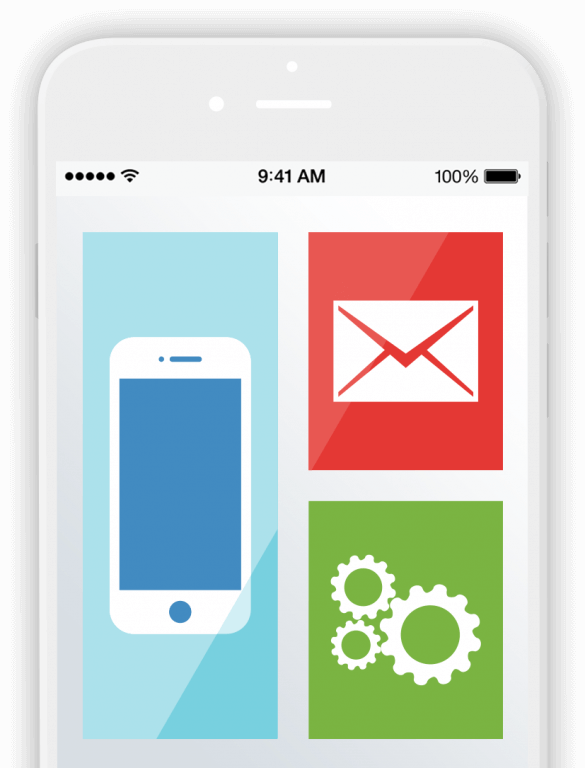Customer support automation solutions to streamline your support processes
Customer support is an extremely important function for any organisation that supplies products or services. Any problems or downtime need to be dealt with quickly and efficiently, especially if the product or service is critical to the customer.
Excelling in customer support is therefore vital to the reputation and growth of an organisation. As a result, many SMEs put a large emphasis on exceeding agreed service levels to ensure continuity and to stay competitive.
Manual customer support processes
Unfortunately, the physical process of customer support can create a large amount of manual employee administration which can detract from the actual time spent on resolving important issues. This is where automating customer support processes can improve performance and reduce human error.
The downside of manual customer support processes:
- Time-consuming, detracting employees away from solving issues
- Data anomalies can occur, caused by human error
- Costly administration process
What is automation in customer support?
Customer support automation essentially removes the reliance on human involvement and manual processing when dealing with customer enquiries or issues. There are numerous functions and processes that can be automated to help improve customer support, ranging from support tickets and communication to invoicing and internal notifications.
How do you automate customer support?
Customer support automation software can integrate CRM and ERP systems, third-party online services and a range of help desk software. Once connected, it is then possible to automate many of the time-consuming tasks, enabling organisations to concentrate on more important aspects to improve service and support, such as developing self-serving customer service applications.
The automation of key customer support processes can be achieved through enhancing your help desk software and your other business systems’ functionality. There are many business process management platforms available which provide code free data integration and process automation across practically any cloud or on-premises information system or database.
For example, business process management platforms can be used for:
- Real time notifications and document automation, e.g. automatically send real-time alerts to external partners or suppliers via SMS messaging or email with attachments (PDF, MS Word, MS Excel etc.)
- Workflow authorisations, e.g. multi-level purchase order authorisation approvals and discount level approvals
- Integration with accounting software, CRM, ERP, help desk software, eCommerce platforms
Download 200 Ways to use BPA Platform
Customer support automation examples
If we take a look at technology industries as an example, it’s not uncommon for a provider to heavily focus on exceeding agreed service levels.
When a support call is usually logged with a technology company, typically the issue would have to be manually confirmed with the customer. In addition, customers often call in to see the status of their logged support request – further eating in to valuable time from support engineers.
How does customer support automation help this issue?
- Customer notifications can be automatically created and sent to the customer informing them that their issue has been logged and investigated.
- Notifications are automatically created and distributed to the customer with status updates and ‘issue resolved’ information.
Removing the repetitive process of informing customers that their support call has been logged enables support team members to gain an incremental amount of additional support time. Providing a high level of customer support in this manner, dynamically from SAP Business One, can have a substantial impact on employee productivity and provide substantial competitive gain.
In addition to the dynamic notification of support calls logged, customers can be dynamically informed when their support incident has been resolved. By pro-actively delivering information directly to the customer, support engineers are being further removed from time-consuming administration due to reduced inbound call volume.
The automation and creation of call issues can be streamlined across the entire help desk process, its related activities and beyond, to further enhance the support process.
Customer support automation can be applied to numerous customer support processes throughout an organisation. Common processes include:
- Support ticket automation
- Integration of customer service and help desk software e.g. Zendesk, ServiceNow
- CRM integration connectors for Salesforce, Microsoft Dynamics CRM, Maximizer CRM, SugarCRM, Agile CRM, Sage CRM and many more
- Notification to support team when new customer service or support calls are received
- Escalation of unresolved or major support issues
- Password reset/unlock requests
- Assigning tickets to an owner with due date and priority
- Issuing invoices, quotes etc.
- Allocation of support calls based on the nature of the problem
- Measuring productivity
- Delivery of welcome packs, documents, statements etc., following customer enquiry
- Communication with customers regarding deliveries, new stock, services etc.
- Providing answers and solutions to frequently asked questions
- Issuing of annual renewal contracts and warranty due to expire reminders
- Returns processes, including system updates, customer notifications and reports
- Integrating direct mail communication providers, such as DocMail and UKMail with other systems and applications
- Self-service customer portal software
- Integrating customer survey applications, such as Qualtrics and SurveyGizmo with business software
Automating support tickets
The speed and quality of responses to a support ticket raised via a company website or system is critical to the reputation of any business. Yet many support team workers still manually process inbound email support tickets. This approach is slow, inefficient and error prone. Automating this process will enable a company to automatically capture inbound support tickets raised, create an incident and assign the task to a support engineer. This eradicates data entry, reduces response times and improves customer service.
Support ticket status data can also be used by many stakeholders. For example, it is important to keep the customer up to date with a ticket status, but equally an internal account manager or support team manager may find the information useful. Keeping all stakeholders up to date with this information can be a time-consuming and a labour-intensive process to administer. Automatically creating and sending support ticket updates via email, SMS or formal reports to customers, account managers or support team managers, reduces costs and ensures organisation-wide visibility of key data.
Businesses that listen and respond to the real opinions of customers perform better than their competitors. Yet many companies fail to assign adequate employee time to the distribution of surveys and subsequent data analysis. Automatically sending survey requests to customers following a business event, e.g. support ticket closure, will enable organisations to measure the effectiveness of the support process which can then be used to fine-tune and improve the service, as well as make better business decisions.
Download Automated Support Tickets Brochure
Integrating help desk software
Customer support can take numerous forms and many companies deliver it as default after every product or service sale. This is particularly true in complex sales environments. The challenge facing these business types is how would a help desk user know when to create a support ticket without visibility of when an order has been processed within the company CRM or ERP solution?
Additionally, help desk data is critical to the performance of the sales team, as customers with open support tickets are less likely to respond positively to upsell propositions. Yet help desk data can often be disconnected from these employees, which exposes the company to an unnecessary level of risk.
Integrating help desks with a CRM, ERP or industry specific application will enable organisations to improve the visibility of critical information to non-help desk users as well as eradicate repetitive data entry. All employees will then have visibility of support ticket information before they communicate with customers.
Working example: TSG Ltd.
IT support solutions provider TSG Ltd. used BPA Platform to integrate its online billing application with SAP Business One to remove repetitive customer support updates and notifications through rules-based automation.
“Historically, when a support call was logged, we would have to manually confirm this with the customer. Furthermore, customers would often call in to see the status of their logged support request which would also absorb valuable time from our support engineers,” explained Sean Ware, Managing Director, TSG Ltd.
To resolve this problem, TSG Ltd. now use BPA Platform to automate customer notifications, informing them that support issues have been logged. Providing this level of customer support dynamically from SAP Business One has had a substantial impact on employee productivity.
“Removing the repetitive process of informing customers that their support call has been logged enables the team to gain incremental amounts of additional support time,” said Ware. “For a company of our size this is substantial competitive gain.”
In addition to the dynamic notification of support calls logged, TSG Ltd. is also using BPA Platform to dynamically inform customers when support incidents have been resolved.
“Once again, by proactively delivering information to customers, we have reduced the number of inbound calls to our support engineers and therefore removed further administration,” explained Ware.
What are the advantages of automated customer support?
The benefits of customer support automation with BPA Platform include:
- Improved and streamlined customer service
- Increased visibility of critical information to all stakeholders
- Costly and error prone administration tasks removed
- Reduced operational costs
- Customer satisfaction and loyalty
- Improved efficiencies
- Full process automation of help desk and customer support processes
- Removal of administration and associated manual data errors
- Increased employee productivity
- Reduced inbound status calls
- Increased customer satisfaction
To find out more information about how Codeless Platforms’ BPA Platform can be used for customer support automation processes, download the case study below or call us on +44 (0)330 998 8700.


